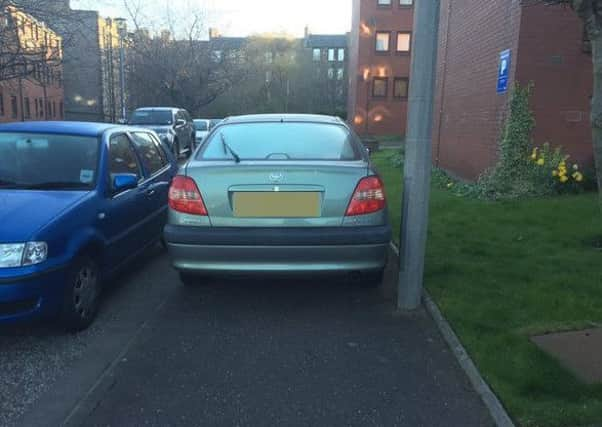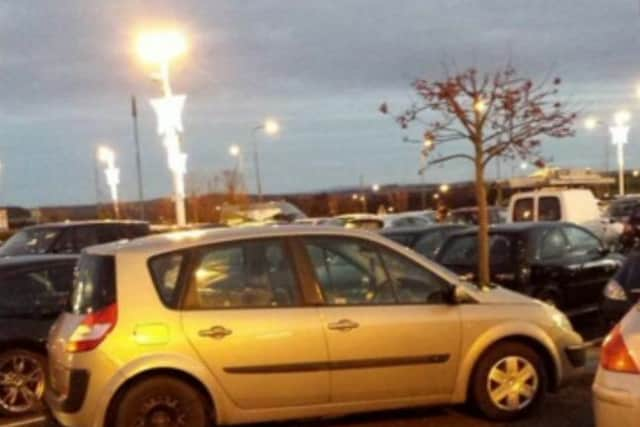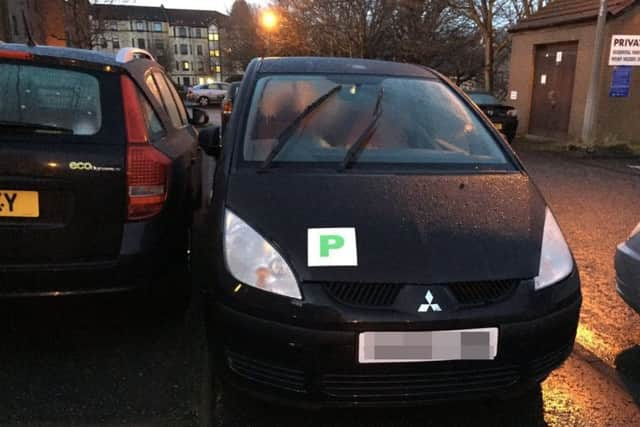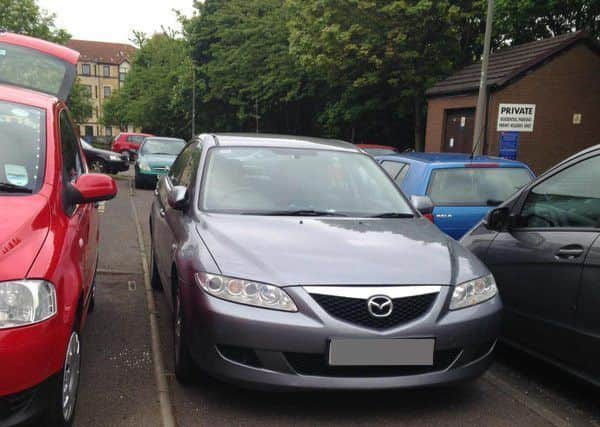Calls for crackdown on '˜selfish' drivers parking on pavements


For the former they force the disabled and parents with prams to navigate the blockages by dangerously moving on to the road – while for the latter, they prevent fellow drivers from accessing their own vehicles.
Now calls have been made for a crackdown on “selfish” car owners who park on footways and pavements, leaving little to no room for others.
Advertisement
Hide AdAdvertisement
Hide AdWhile it is illegal to drive on pavements in Scotland, there is no specific legislation which prevents drivers from parking on them.


However, it is an offence to obstruct another vehicle and cars can be impounded.
Residents, campaigners and politicians said it was time for more stringent enforcement of the rules.
The charities Guide Dogs Scotland and Living Streets Scotland highlighted the problems which parking on pavements causes for people with visual or mobility impairments, wheelchair or mobility scooter users, families with pushchairs and cyclists.
Advertisement
Hide AdAdvertisement
Hide AdNiall Foley, Guide Dogs Scotland’s engagement manager, said: “Inconsiderate parking forces pedestrians onto the road and into the path of vehicles. It is a major barrier for people with sight loss or reduced mobility. We urge all motorists to park responsibly and not block pavements or crossings.”


The problem is particularly acute in areas with lots of tenements and modern flat complexes.
Office worker Ciorstaidh McIntosh, 31, who lives in the complex on Bryson Road, Fountainbridge, said she had been jammed in on numerous occasions by people parking on the pavement right next to her driver’s door.
“The 90 or so parking spaces outside the flats are private,” she said. “The upkeep is paid for in factoring fees by the residents and the access road is private. Yet people continually use the road and then park on the pavements, blocking our cars.
Advertisement
Hide AdAdvertisement
Hide Ad“I have reported it to the police, who suggested I get in the passenger door and into the driver seat that way, but I have a high central console which means I can’t – and I shouldn’t have to.”


Mrs McIntosh said she had even been verbally abused after asking fellow drivers to stop parking on pavements.
“It is deplorable,” Mrs McIntosh continued. “You park and go into your flat and when you come out again, someone has parked right hard up against the door. What can you do?
“It is sheer selfishness – their thinking is ‘sod everyone else’. There is plenty of permit parking in the area but these are people who are trying to avoid paying for parking. I have even been verbally abused for trying to stop someone parking on the private grass outside my flat.”
Advertisement
Hide AdAdvertisement
Hide AdLocal Green councillor Gavin Corbett said he was well aware of the Fountainbridge issue and hopes that legislation currently going through the Scottish Parliament will make a difference.


He said: “Bryson Road is part of a very high-density area of the city and, going back a few years, before parking controls were introduced in the wider area, it used to be chaotic.
“So, there is good reason for having parking controlled, both on-street and in the private area at the back. It is really disappointing if a minority of drivers are parking in a way which obstructs others.
“I’ll be speaking to the local community police officers to ask them to take a more robust stance when there is actual obstruction taking place. Maybe it’ll need one or two cars to be impounded to get the message through.
Advertisement
Hide AdAdvertisement
Hide Ad“Longer term, I, and other Green councillors, have been strongly backing draft legislation to make pavement parking an offence. The sooner that clears the Scottish Parliament the better.”
A Footway and Double Parking Bill was proposed in 2015, when MSPs voted in principle to make it an offence to park on pavements.
And in June last year transport minister Humza Yousaf reiterated plans to progress legislation on footway parking.


A Transport Scotland spokesperson said: “Irresponsible parking can have a negative impact by restricting access for emergency vehicles or putting the safety of pedestrians and other motorists in jeopardy as it forces people onto the road amongst moving traffic.
Advertisement
Hide AdAdvertisement
Hide Ad“We are committed to introducing legislation on parking in this parliamentary session and a consultation on improving parking practices in Scotland is being developed and is expected to be published soon.
“We want to hear views from stakeholders on how we can improve the laws on parking, what restrictions and exemptions should be applied and how we can deliver a consistent approach to managing and enforcing parking on public roads to improve accessibility for all.”
The parliamentary legislation is also being supported by the city council.
Transport leader Councillor Lesley Hinds said: “Pavement parking is inconsiderate and dangerous, and it is disappointing to see this kind of behaviour anywhere in the city.
Advertisement
Hide AdAdvertisement
Hide Ad“In addition to complying with legal restrictions and the Highway Code, all road users have a duty of care towards others.”
Protest over parking spaces
WALKING campaigners have been angered after plans for 95 parking spaces for homes being built on the site of the old Boroughmuir High School were recommended for approval.
Councillors will decide this week whether to give the spaces the green light – but Living Streets say the Bruntsfield location means residents have plenty of access to other forms of transport.
The campaigners have now written to councillors to outline their concerns. The letter reads:
Dear Councillors
Advertisement
Hide AdAdvertisement
Hide AdLiving Streets Edinburgh Group is dismayed to hear that ‘Having considered the submitted supporting information, the council as roads authority has no objection to the proposal on road safety grounds’.
As we noted in our objection, a development with 95 parking spaces cannot be consistent with the council’s transport and environmental objectives. The location is extremely well-sited for travel by bus (eight frequent, regular services within three minutes’ walk), bicycle and on foot. The sustainability of the local Bruntsfield area will be enhanced by a car-free development which is actively aimed at people attracted to a car-free lifestyle. We also strongly opposed the suggestion that there should be 16 new on-street parking spaces on Viewforth in addition, for the same reason. An option could be to site a car-club facility on or near the site.
The council cannot on the one hand endorse a ‘business as usual’ development like this, and on the other hand claim that it is pursuing enlightened transport and environmental policies which minimise the impact of the car and make the public realm a much better place for walkers, cyclists and people using public transport. If a progressive approach to parking cannot be adopted at the Boroughmuir site, where alternatives to the car are myriad, what chance is there that a visionary approach will be taken anywhere else in the city?
David Spaven, convenor